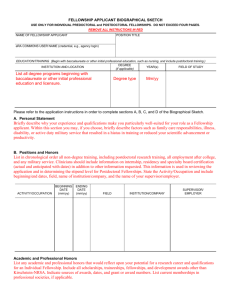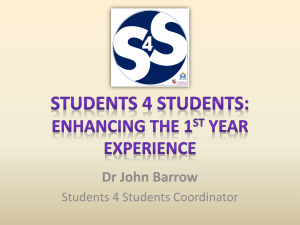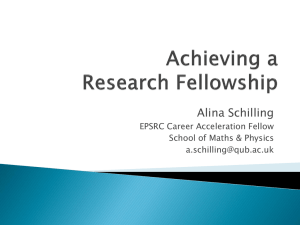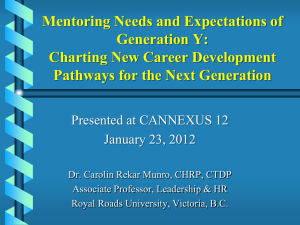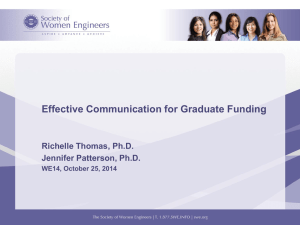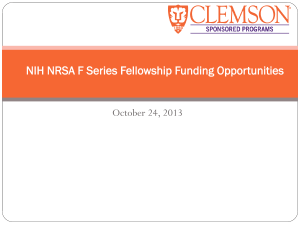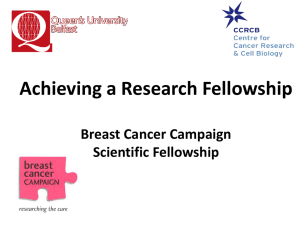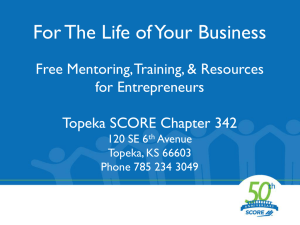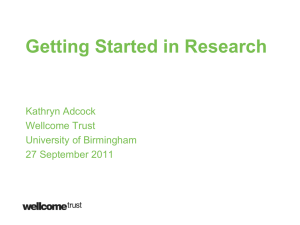U.S. DEPARTMENT OF AGRICULTURE NIFA Fellowships Grant
advertisement
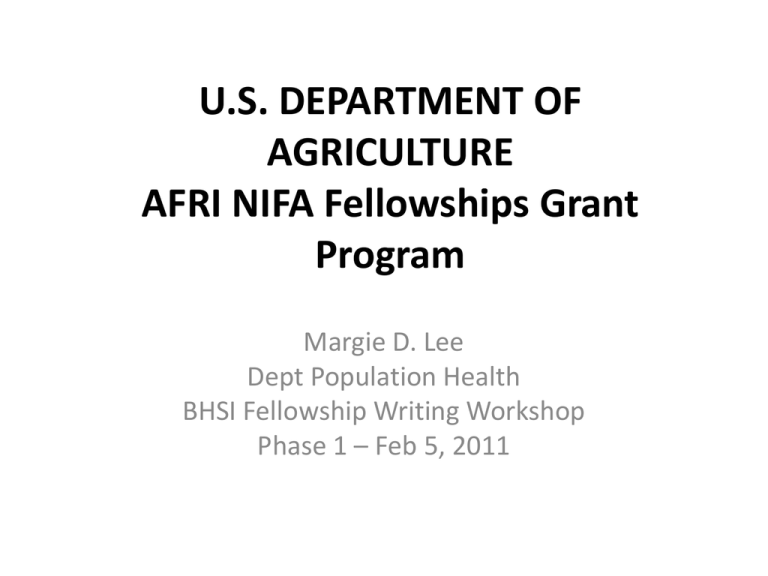
U.S. DEPARTMENT OF AGRICULTURE AFRI NIFA Fellowships Grant Program Margie D. Lee Dept Population Health BHSI Fellowship Writing Workshop Phase 1 – Feb 5, 2011 United States Dept Agriculture Agriculture and Food Research Initiative Competitive Grants Program NIFA Fellowships Grant Program The AFRI NIFA Fellowships Grant Program is focused on: • predoctoral students: developing technical and functional competence • postdoctoral scientists: research independence and teaching credentials • in the agriculture, forestry, and food sciences that are within NIFA’s challenge areas • through well-developed and highly interactive mentoring and training activities. What does NIFA fund? • Program Area Priority – NIFA Fellowships will support multidisciplinary projects across any of the three components of the agricultural knowledge system (research, education, and/or extension) that address one or more of the following issues: – Keep American agriculture competitive while ending world hunger (animal, insect & plant disease research, animal, insect, and plant production/control, economics, etc) – Improve nutrition and end childhood obesity – Improve food safety for all Americans; – Secure America’s energy future through renewable biofuels; – Mitigate and adapt agriculture to variations in climate (animal and plant diseases, production, ecology, bioremediation). AFRI NIFA Fellowships Grant Program • In FY 2010, approximately $6 million is available to support the NIFA Fellowships Grant Program within AFRI to provide fellowships to outstanding pre- and postdoctoral students in the agricultural sciences. • AFRI invites applications from doctoral candidates and individuals who will soon receive or have recently received their doctoral degree for a Pre- or Postdoctoral Fellowship Grant, as appropriate, for research, education, extension, or integrated activities • Pre and Postdoc Fellowships are mentored awards Award • All Pre- and Postdoctoral Fellowship Grants will be separate and individual awards. • All Pre- and Postdoctoral Fellowship Grants have award duration of two years. Eligibility • Predoc: students pursuing a Ph.D. degree and who have advanced to Ph.D. candidacy by January 1 of the fiscal year in which the application is submitted • Postdoc: who have received their doctoral degree not earlier than January 1 of the fiscal year three years prior to the submission of the proposal and not later than nine months after the proposal due date. • Applicant must be citizen, national, or permanent resident Predoctoral Fellowship Grants: • $37,500 per year for two years = $75,000 total – stipend support: up to $23,000 per year – tuition, fees, and fringe benefits (insurance): up to $12,000 per year) – Travel: up to $2,500 per year – Institutional allowance, in lieu of indirect costs, not to exceed $2,400 per year, may be requested within the $75,000 per award maximum limit. – Indirect costs are not permitted on Predoctoral Fellowship Grant awards. UGA Grad Tuition Spring 2011 Hours In-State Registered Tuition 1 275 Out-of-State Tuition 896 Total of Student Fees Listed Above 833 Total In-State Tuition and Fees Total Out-of-State Tuition and Fees 1108 1729 2 550 1792 833 Fellowship recipient enroll for 3 hrs for 2 semesters/yr 3 825 2688 833 1383 2625 1658 3521 4 1100 3584 833 1933 4417 5 1375 4480 833 2208 5313 6 1650 5376 833 2483 6209 7 1925 6272 833 2758 7105 8 2200 7168 833 3033 8001 9 2475 8064 833 3308 8897 10 2750 8960 833 3583 9793 11 3025 9856 833 3858 10689 12 3300 10752 833 4133 11585 UGA Grad School Enrollment Policy • Doctoral students who have advanced to candidacy and thesis-writing master’s students who have satisfactorily completed all required courses (exclusive of 7000 and 7300) will be allowed to register at a rate equivalent to the prevailing in-state tuition rate. • Continuous enrollment = registering for a minimum of three (3) credits in at least two semesters per academic year (Fall, Spring, Summer) • Graduate students must register for a minimum of 3 hours of credit during any semester in which they use University facilities and/or staff time. Therefore Fellowship recipients, who have been admitted to candidacy, only have to enroll for 3 credits for two semesters per year in order to maintain graduate status. Postdoctoral Fellowship Grants • total award of $130,000 for two-year duration. – Salary and benefits – Other costs are allowable costs if properly justified • • • • Supplies Travel Workshops Publication costs – Institutional allowance, in lieu of indirect costs, not to exceed $2,400 per year, may be requested within the $130,000 maximum award limit. – Indirect costs are not permitted on Postdoctoral Fellowship Grant awards. What are the components of the application? • Electronic application package that contains all of the required forms: www.grants.gov • Administrative & Compliance forms • Project content: – Candidate – Training and mentoring plan – Mentors – Training environment – Training Project (research, extension, teaching) Candidate: documented achievement of high educational quality and excellence • Biosketch: – Degrees and Majors – Grade point average and rigor of coursework (list of grades, courses and GPA) OR include transcripts in application package – Graduate Record Exam scores – Publications and published abstracts – Scholarly activities and evidence of leadership – Honors and other acknowledgement of accomplishments – Professional society memberships Candidate: documented achievement of high educational quality and excellence • Project narrative should also include a narrative statement of your history and previous experiences that are relevant to your potential success as an independent scientist. You should discuss your strengths and weaknesses and how this grant will provide the resources to strengthen both. • Your mentor’s support letter should also address your potential and where you rank among other students/postdoc that have been in the program/lab Components of the application • Application REVIEW will evaluate content: – Candidate – Training and mentoring plan – Mentors – Training environment – Training Project (research, extension, teaching) Training and Mentoring Plan: • Activities that support the development of your research project (journal clubs, conferences, workshops, wetlabs) • Activities that support development of your scientific expertise (courses or workshops in biostats, proteomics, bioinformatics, etc) • Activities such as clubs, courses or workshops that will be used provide professional development (scientific writing, grantwriting, oral communication, teaching, certifications) • How will your mentors function to facilitate the above activities and to assess your progress and improvement? Components of the application • Application REVIEW will evaluate content: – Candidate – Training and mentoring plan – Mentors – Training environment – Training Project (research, extension, teaching) Mentors • Are mentors experienced and accomplished in the relevant areas? – Publications – Funding • Mentors’ letters should describe – Their responsibilities in the mentoring plan – State applicant’s access to space and resources – Describe their previous experiences and success in mentoring students and/or postdocs? Components of the application • Application REVIEW will evaluate content: – Candidate – Training and mentoring plan – Mentors – Training environment – Training Project (research, extension, teaching) Training Environment • Description should include information about the institution/college/school’s facilities and resources available to the applicant – Relevant Facilities – Relevant areas of excellence – Special or unique resources that may not be available elsewhere – Description of training programs available that illustrate a fruitful training environment Components of the application • Application REVIEW will evaluate content: – Candidate – Training and mentoring plan – Mentors – Training environment – Training Project (research, extension, teaching) Training Project • • • • Research Projects Education Projects Extension Or a combination of the above = *Integrated Project* (Integrated projects are favored in USDA’s funding formula) Research Projects • Single-function Research Projects support fundamental or applied research conducted by the individual Fellow, who will work with a mentor within the same discipline or as part of a multidisciplinary team. – Fundamental research means research that (i) increases knowledge or understanding of the fundamental aspects of phenomena and has the potential for broad application and (ii) has an effect on agriculture, food, nutrition, or the environment. – Applied research means research that includes expansion of the findings of fundamental research to uncover practical ways in which new knowledge can be advanced to benefit individuals and society. – Multidisciplinary projects are those in which investigators from two or more disciplines collaborate closely to address a common problem. These collaborations, where appropriate, may integrate the biological, physical, chemical, or social sciences. (favored in USDA’s funding formula) Education Projects • Education Projects address one or both of the following key strategic actions: – Training students for Associate, Baccalaureate, Master’s or Doctoral degrees; and/or – Preparing K-12 teachers and higher education faculty to enhance their understanding and, therefore, the teaching of agriculture, forestry, and food sciences. • These projects should lead to measurable, documented changes in learning, actions, or conditions in an identified audience or stakeholder group. These projects should synthesize and incorporate a wide range of the latest relevant research results Extension Projects • Extension Projects address one or more of the following key strategic actions: • Support informal education to increase food and agricultural literacy of youth and adults; • Promote science-based agricultural literacy by increasing understanding and use of food and agricultural science data, information, and programs; • Build science-based capability in people to engage audiences and enable informed decision making; Extension Projects • Develop new applications of instructional tools and curriculum structures that increase technical competency and ensure global competitiveness; • Offer non-formal learning programs that increase accessibility to new audiences at the rate at which new ideas and technologies are tested and/or developed at the community-scale; and • Develop programs that increase public knowledge and citizen engagement leading to actions that protect or enhance the nations’ food supply, agricultural productivity, environmental quality, community vitality, and/or public health and well-being. Integrated Project • An Integrated Project includes at least two of the three functions of the agricultural knowledge system (i.e., research, education, and extension) within a project, focused around a problem or issue. The functions addressed in the project should be interwoven throughout the life of the project and act to complement and reinforce one another. Postdoc Award - perk • Fellow will be required to serve on an AFRI peer review panel in Washington, DC to evaluate competitive proposals during the Fellowship.
